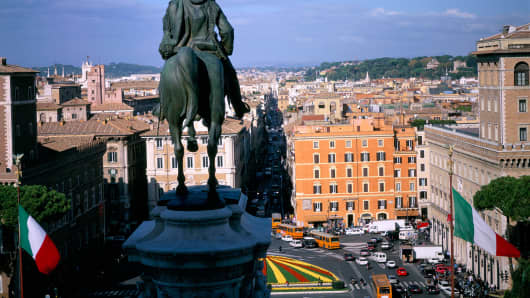Italy's caretaker government on Wednesday sharply hiked its targets for public debt this year and next despite waves of austerity measures, and said there was now room for less restrictive fiscal policy.
An economic planning document (DEF) published by Mario Monti's outgoing technocrat cabinet forecast that the debt, which hit an all-time high of 127 percent of output last year, would rise further to 130.4 percent in 2013.
That was an upward revision from 126.1 percent targeted previously. The government hiked the 2014 debt target even more sharply, to 129.0 percent of GDP from 123.1 percent.
Italy, the euro zone's third largest economy, has the bloc's second-largest debt after Greece in terms of percentage of GDP. When Monti took office the debt stood at 120.8 percent of GDP.
Monti, who replaced Silvio Berlusconi as prime minister as Italian borrowing costs surged at the end of 2011, has had to repeatedly hike his targets for the fiscal deficit and debt, as a steep recession has taken a toll on public finances.
The economy contracted by 2.4 percent last year and last month the government forecast it would shrink by 1.3 percent this year, a projection considered optimistic by many economists.
Gross domestic product fell for six consecutive quarters to the end of 2012 and recent data suggests no recovery is in sight, though Economy Minister Vittorio Grilli told reporters he still expected a pick-up later this year.
Last month the government raised its deficit target for this year to 2.9 percent of gross domestic product from 1.8 percent, after last year's deficit came in bang on the European Union's 3 percent ceiling.
Growth, Jobs
Despite the worsening public finance outlook, slides published as part of the DEF said Italy would "soon exit the excessive deficit procedure" by which the EU imposes corrective action on high-deficit countries.
This will allow for less restrictive fiscal policy which can "pay more attention to growth and jobs", the slides said.
European Monetary Affairs Commissioner Olli Rehn confirmed in Brussels that there was "a very high probability" that Italy would leave the excessive deficit procedure in May.
Monti told reporters the DEF contained less detailed policy plans than usual, reflecting the fact the government would soon leave office following February's inconclusive election.
He warned whoever takes over from him not to veer too far from the tough fiscal line he adopted.
"Credibility is very costly to acquire but it can be lost very rapidly," he said. "It would be disastrous to lose this capital today."
Nonetheless, the slides said there was now room to reform labor taxes, offer fiscal incentives for employers that hire permanent workers and invest more in education and research.
All Italy's main political forces say they want to change course from the austerity imposed by Monti.
The hike in the debt targets was partly due to a recent decision by the government to settle 40 billion euros of debts to private suppliers, a move which concerned the European Commission because of its possible impact on public finances.
Berlusconi's center-right grouping says it wants more than 40 billion euros settled, out of a total backlog estimated at around 100 billion.
Italy has been stuck in political gridlock since the election. No bloc won enough votes to govern and negotiations to form a broad coalition are still stalled. Monti's centrist alliance fared worse than expected, leaving him no obvious role in the formation of a government.



